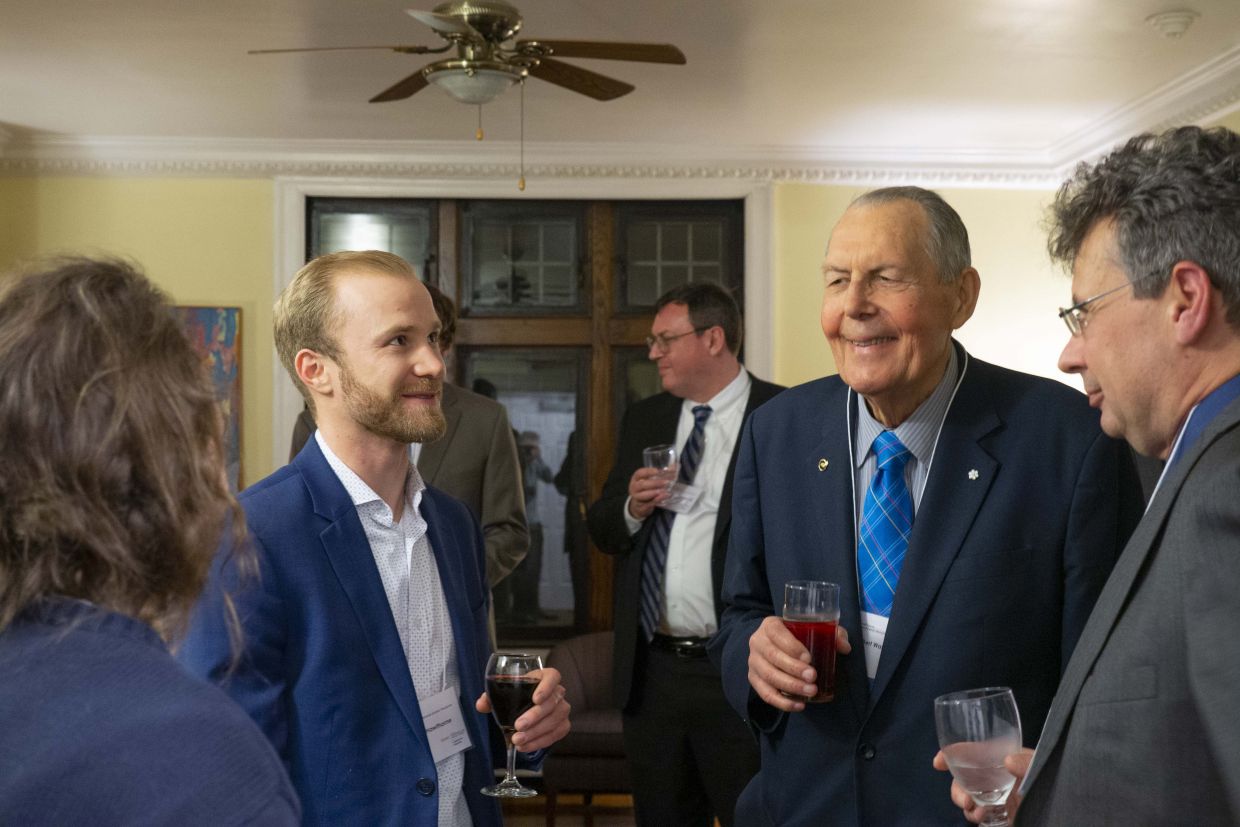Bert Wasmund, Sc’61, MASc’63, LLD’08, believed a university education could be life changing.
For decades, Dr. Wasmund and his family have funded numerous awards to support this belief — and he has been credited with enabling the success of more than 100 students in the Faculty of Engineering and Applied Science and other disciplines at Queen’s. Dr. Wasmund also wanted to make space for students who faced barriers in attending university, including Indigenous students and students from high schools in the area of Bancroft, Ont., where he grew up.
Wasmund told a podcast hosted by Queen’s Faculty of Engineering and Applied Science in 2019 about his upbringing in the tiny rural community of Monteagle, a few kilometres north of Bancroft, and how he got his start at Queen’s.
“We were very humble. People had to work hard at mixed farming and timbering to make a living at all. (I) went to a one-room public school, all eight grades in the same class, taught by one teacher. I went to high school in Bancroft and then I applied to universities, but it wasn't going so well. So, I went to work at (the historic Bicroft Uranium Mines) and that was really a good thing because I got some good mentors.”
He was uncertain about where he might go to university until he met an alumnus at Bicroft who convinced him to come to Queen’s.
“That was one of the best moves I ever made. That got me straightened out and … I put my abilities better to work,” he said.
He earned his Bachelor of Science in 1961 and Master of Science in Chemical Engineering in 1963. He then went to the University of Toronto, where he earned a PhD. Soon after, he joined Hatch, a Canadian firm that supplies engineering, project and construction, business consulting, and operational services to the mining, metallurgical, energy, and infrastructure sectors. He would become one of just four to lead the company in 1990 and forged a decorated, 50-year-long career at Hatch.
He was known for his technical skills and innovative approaches to solving long-standing industrial problems. His efforts have resulted in important improvements to metal works productivity, cost effectiveness and energy efficiency, as well as environmental and workplace safety developments. His name is on several patents for specialized metallurgical reactors, as well as cooling systems used for protecting the walls of smelters. These achievements earned Dr. Wasmund worldwide recognition.
He was awarded the prestigious Noranda Airey Award in 1998, inducted into the Canadian Mining Hall of Fame in 2011, and earned the Ontario Professional Engineers' Gold Medal in 2012. He was also granted honorary doctorates from Queen's and the University of Toronto. In 2017, Dr. Wasmund became a member of the Order of Canada.
Yet he never forgot his alma maters. He served on the Queen's University Applied Science advisory board. He has lent his support to research initiatives and funded scholarships for undergraduate and graduate students at both universities.
The Wasmund Family Memorial Scholarship, established in honour of his parents, has been a critical component in the development of many successful Queen’s graduates. It opened opportunities for students at North Hastings High School, Madawaska Valley District High School, Opeongo High School, and Renfrew Collegiate Institute, and helped students succeed in fields as diverse as biology, medicine, economics, linguistics, public administration, law, music, engineering, teaching, nursing and social work.
Dr. Wasmund also established the Bert Wasmund Scholarship for Sustainable Energy Research along with his son, Dr. Eric Wasmund, Sc’88.
Together, the Wasmunds created two funds aimed at supporting Indigenous students entering their first year of the Bachelor of Applied Science degree program at Queen’s, with renewable options for each year of their Engineering undergraduate degree.
Melanie Howard, Artsci’95, Ed’98, is the director of Indigenous Futures in Engineering, a program that supports Indigenous students enrolled in engineering at Queen’s, as well as youth in their communities. Howard saw first-hand the impact the Wasmunds’ generosity had on students attending Queen’s.
“For Indigenous students, it was the ability to think about coming to a university like Queen’s, which requires most students to move to Kingston and thus is more expensive than something closer to their homes,” she says.
Howard adds that Dr. Wasmund took pride in connecting with students — acting as a mentor to many scholarship recipients. He also encouraged students to gain practical experience in engineering at Hatch. Dr. Wasmund and his son, Eric, also hosted a dinner with the students each year that, Howard says, was a highlight for Dr. Wasmund.
Dr. Kevin Deluzio, Sc’88, MASc’90, PhD’98, dean of the Faculty of Engineering and Applied Science, remembers Dr. Wasmund’s determination in helping students succeed.
“Bert was a visionary who had a transformative effect on industry, on access to post-secondary education, and, most importantly, on the lives of the many young people he supported and mentored over the years,” Dean Deluzio says. “When Bert established his most recent fund, the Wasmund Family Indigenous Engineering Scholars, I learned more about his deep passion for the power of education and his commitment to a better future for Canada’s Indigenous youth.
“Bert inspired me to do more as well, for our students, our profession, and our community. He has left a strong legacy that will be carried on by his son, Dr. Eric Wasmund.”
Professor Emeritus Tom Harris, Sc’75, knew Dr. Bert Wasmund for 30 years in his role as department head, dean, vice-principal (Academic and Advancement) and provost.
“Bert was an extraordinary individual who quietly excelled in so many of his interests — science and engineering, leadership, philanthropy, and mentorship,” says Harris. “Most of all, I will remember Bert as someone who cared deeply about this country, and the importance of education for those who did not have the opportunities that many of us had.”


